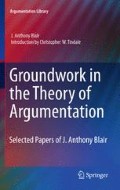Abstract
The purpose of the chapter is to explore some historically-offered possible answers to the question of what alternatives there might be to deduction and induction. I briefly describe and characterize six accounts that seem on the face of it to portray some third type of assessment of an illative move, independent of deductive validity and of inductive strength: those of Wisdom, Toulmin, Wellman, Rescher, defeasible reasoning theorists such as Pollock, and Walton. I then compare these accounts under eight headings. I conclude that the parallel and largely independent development of theories of defeasible reasoning and informal approaches to argument interpretation and appraisal seem to put beyond doubt the empirical fact of such reasoning and argument and to argue for its bona fides. The proposition that such reasoning and arguments are legitimate, one of the founding hypotheses of the informal logic movement, seems to have found fairly widespread confirmation.
Reprinted, with permission, from H. V. Hansen, C. W. Tindale, J. A. Blair, R. H. Johnson, & D. M. Godden (Eds.). Dissensus and the Search for Common Ground (Proceedings of the Seventh OSSA Conference, University of Windsor), 2007. CD-ROM. This chapter is much revised from an earlier incarnation presented to the research seminar at the Centre for Research in Reasoning, Argumentation and Rhetoric at the University of Windsor in February 2007. I thank Patrick Bondy, Hans Hansen, Ralph Johnson, Robert Pinto and Christopher Tindale for their constructive critical comments on that occasion.
Access this chapter
Tax calculation will be finalised at checkout
Purchases are for personal use only
References
Brandom, R. B. (1994). Making it explicit: Reason, representing and discursive commitment. Cambridge, MA: Harvard University Press.
Eemeren, F. H. van, & Grootendorst, R. (2004). A systematic theory of argumentation: The pragma-dialectical approach. Cambridge: Cambridge University Press.
Fohr, S. D. (1980a). The deductive-inductive distinction. Informal Logic Newsletter, 2(2), 5–8.
Fohr, S. D. (1980b). Deductive-inductive: reply to criticisms. Informal Logic Newsletter, 3(1), 5–10.
Govier, T. (1980a). Critical review of challenge and response by Carl Wellman. Informal Logic Newsletter, 2(2), 10–15.
Govier, T. (1980b). More on deductive and inductive arguments. Informal Logic Newsletter, 2(3), 7–8.
Hitchcock, D. (1980). Deductive and inductive: Types of validity, not types of argument. Informal Logic Newsletter, 2(3), 9–10.
Hitchcock, D. (1981). Deduction, induction and conduction. Informal Logic Newsletter, 3(2), 7–15.
Johnson, F. (1980). Deductively-inductively. Informal Logic Newsletter, 3(1), 4–5.
Pollock, J. L. (1991). A theory of defeasible reasoning. International Journal of Intelligent Systems, 6(1), 33–54.
Pollock, J. L. (1992). How to reason defeasibly. Artificial Intelligence, 57(1), 1–42.
Reiter, R. (1980). A logic for default reasoning. Artificial Intelligence, 13(1–2), 81–132.
Rescher, N. (1976). Plausible reasoning: An introduction to the theory and practice of plausible inference. Assen-Amsterdam: Van Gorcum.
Skyrms, B. (1975). Choice and chance: An introduction to inductive logic (2nd ed.). Encino, CA: Dickenson.
Walton, D. N. (1996b). Argumentation schemes for presumptive reasoning. Mahwah, NJ: Lawrence Erlbaum.
Weddle, Perry. (1979). Inductive, deductive. Informal Logic Newsletter, 2(1), 1–5.
Weddle, Perry. (1980). Good grief! More on induction/deduction. Informal Logic Newsletter, 3(1), 10–13.
Wisdom, J. (1991). Proof and explanation: The Virginia lectures. S. F. Barker (Ed.). Lanham, NY: University Press of America.
Koons, R. (2009). Defeasible reasoning. In Zalta E. N. (Ed.), The Stanford Encyclopedia of Philosophy (Winter 2009 Edition). Retrieved September 14, 2011, from http://plato.stanford.edu/archives/win2009/entries/reasoning-defeasible/
Sellars, W. (1953). Inference and meaning. Mind 62, 313–338.
Weinstein, M. (2003). Logic in contexts. In J. A. Blair, H. V. Hansen, & C. W. Tindale (Eds.), Informal logic @ 25, proceedings of the 2003 OSSA conference. CD ROM.
Rescher, N. (1977). Dialectics: A controversy oriented approach to the theory of knowledge. Albany, NY: State University of New York Press.
Chisholm, R. M. (1957). Perceiving: a philosophical study. Ithaca, NY: Cornell University Press.
Hitchcock, D. (2005). Good reasoning on the Toulmin model. Argumentation, 1(3), 373–391.
Pinto, R. C. (2006). Evaluating inferences: The nature and role of warrants. In D. Hitchcock & B. Verheij (Eds.), Arguing on the Toulmin model: New essays on argument analysis and evaluation (pp. 115–144). Dordrecht: Springer.
Reiter, R. (1987). Non-monotonic reasoning. Annual Review of Computer Science, 2, 147–186.
Govier, T. (1980c). Assessing arguments: What range of standards? Informal Logic Newsletter, 3(1), 2–4.
Author information
Authors and Affiliations
Corresponding author
Editor information
Editors and Affiliations
Rights and permissions
Copyright information
© 2012 Springer Science+Business Media B.V.
About this chapter
Cite this chapter
Blair, J.A. (2012). The “Logic” of Informal Logic. In: Tindale, C. (eds) Groundwork in the Theory of Argumentation. Argumentation Library, vol 21. Springer, Dordrecht. https://doi.org/10.1007/978-94-007-2363-4_9
Download citation
DOI: https://doi.org/10.1007/978-94-007-2363-4_9
Published:
Publisher Name: Springer, Dordrecht
Print ISBN: 978-94-007-2362-7
Online ISBN: 978-94-007-2363-4
eBook Packages: Humanities, Social Sciences and LawPhilosophy and Religion (R0)

